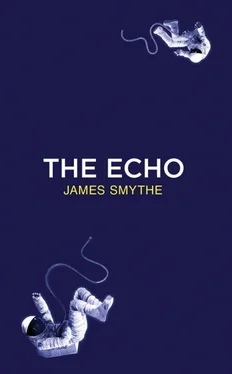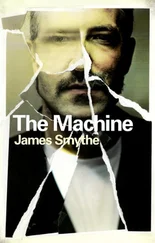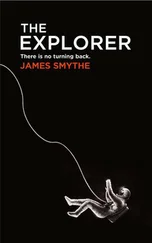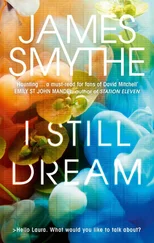‘See you when we wake up,’ she says. She reaches for the lid; her touch alone makes it descend, bringing it down around her. The glass darkens as it lowers. I flatten myself against the bed as well, and I fasten the magnets, and I try to stay still, because I am still not used to this; the feeling of never being flat, of never being orientated one way over the other. I rest my head on the bed, snug inside the plastic form that’s been moulded around our individual physical shapes. I wait until a click comes over the intercom, and I hear Tomas’ voice.
‘This is the first milestone on the road to the stars,’ Tomas says. ‘Beds closing in five. Four.’ He finishes the countdown and the glass slides down and seals me in. Enough air to breathe, to sustain, that’s the deal. When you sleep you naturally need less. Your body rights itself, puts itself into a state of optimum intake. It aids the depth of your sleep as well, having less air. I shut my eyes and wait for sleep to take me. I know that it cannot be long now.
I hear the engines kick in, and the rumble that they send throughout the entire ship. For that second, it feels like an explosion. I hear the joining door being retracted, and the order that it be so, and I hear Tomas’ voice over the intercom telling the ground crew to prepare for launch. I keep my eyes shut and think about the path we’re going to take, and how the launch will look. We’ve run so many simulations – and a simulation was how we knew to launch from the NISS in the first place, how the money saved on building an extension here to do it was proven to be the right choice by another simulation – and I can see them all running at the same time.
When I used to fly in airplanes I would shut my eyes for a second as we took off and picture the plane exploding, bursting into flame. They say that if a plane is going to crash, it’s statistically most likely to happen as it takes off. I figured that if I got past that I was pretty safe. I imagine this ship exploding. I imagine the pieces floating all around me in space. I imagine me floating amongst them.
Tomas does the other checks, his voice talking through every stage, and I start to wonder why I’m not asleep yet. I should be, by now. This is crucial. Sometimes people need a few minutes to really let the sedative sink in, I remind myself. Sometimes the body’s natural adrenalin, the endorphins, they need longer to be counteracted and swallowed by the sleep. But then: now I am worrying that I am not asleep. In my life I have insomnia, I suppose, of a sort: when pressure mounts and the following day carries any sort of importance, I will worry all night, worry that I am not going to achieve the required amount of sleep to function at an optimum the following day. This is a self-fulfilling prophecy, as the worry is then the thing that conspires to keep me awake, rolling around in my head in circular patterns that never stop looping in on themselves. Only when I have given up all hope do I stand a chance of actually falling asleep: when I have managed to pass that point, to realize that there is nothing I can do now, and that the day I was so worried about is likely ruined. It is a hindrance; a horror. I sleep so badly, because almost every day carries that pressure. Tablets do not help, not really: all they do is render me more tired than I would ordinarily be when I awake. Eventually nature takes over and I sleep: but it is fitful, and it is not what I want. This injection: this is to be my salvation for this leg of the journey. After this, I will worry about it as and when.
I cannot see a clock from here. There’s nothing. That’s an oversight, and I should have thought about that. There are no microphones in the beds either, another oversight. It’s to protect the seal: the fewer holes there are, the less chance of there being a crack. The pilot on the Ishiguro died before they even woke up, probably because of a gap in the seal, something like that. So we were cautious. It’ll settle in. I’ll sleep soon, because this is medically controlled. This is something I cannot avoid. On occasions, when I have been at my most desperate for sleep, I have taken painkillers: something strong enough to dull everything else, to remove my faculties from worrying about the sleep itself. This is like a better version of them: unavoidable, inevitable.
‘Launch crew prepare,’ I hear through the ship. You can’t open the beds from the inside once they’ve been sealed. If you could, you could accidentally do it, and there’s nothing worse than that thought. The speeds that the ship will reach as it pushes off from the NISS – free of the trappings of any real gravitational pull, free of the resistance offered by an atmosphere – are so ridiculously powerful that they could – or would – damage the human body. Our bones, our bodies, they are not strong enough. The beds are pressure sealed to provide an environment that the body can cope with. They create their own pressure level inside them; protect the crew from the g forces. It’s another of mine and Tomas’ innovations. Another way that we are making this expedition work. If any of the crew were to be out of their beds – and the controlled environment created therein – they would likely die. Their body would be found pulverized, as if it had been beaten to death. But I am not loose. I am in here, awake. I don’t know if this is dangerous. I cannot think about how dangerous this is. I shout.
‘Help,’ I shout, ‘I am not asleep yet!’ I call Inna’s name, hoping that I’ll see her descend and open my bed, and inject me again, triple-strength, able to level me to slumber while this flight happens. I was always scared of flying as well: of seeing the Earth get smaller underneath me. Not like I will see it from space, that doesn’t faze me, because you can see everything in one go: more the sensation of suddenly glimpsing people as specks, and cars as ants, and then everything smaller and smaller, houses like dust, and then whole towns. But Inna doesn’t come, and everything is dark, soundtracked by the rumble of the engines proper: through everything, right through the hull. Everything underneath me feels like vibration, nothing else. I feel my bones rattle, and my teeth in my jaw. ‘I should be asleep!’ I shout, but my voice dulls itself against the inside of my bed, and against the growling of the ship, and against the paralytic. My words slurred.
The engines fire for launch in three phases. First phase is a warm-up, bringing the temperature of the engines up to the necessary point. The second phase – the phase that I feel kick in through the rumble, like a foot on a gas pedal while the handbrake remains pulled on – adds the injectant and coolant into the burner, readying to add it to the engines themselves. ‘Please,’ I hear myself say – an echo through the rumble – and then the third phase.
‘Countdown time,’ Tomas says. He goes through the numbers, twenty to one. I brace myself. I don’t know what will happen. Why did we have to be asleep for this part of the launch? Because it made sense. Because we were liable to panic. Because the vibrations of the ship would be so violent that we weren’t to struggle against them. I have always hated sleep. Not been afraid of it, that’s wrong, but felt it a waste. Tomas slept less than I did, and he would play pranks on me as I overslept, as I lazed about; but it’s more than that. He would have achieved so much by the time that I woke up. He would have done things. Found things. Now, he’s meant to be awake and guiding me, and I’m meant to be asleep, and letting him, but I’m not. I want to be. I don’t want to die, here. I don’t want to be shaken apart. I tell myself not to struggle. I have the self-control to do this, I tell myself. I say it aloud; or I think that I do.
Читать дальше
Конец ознакомительного отрывка
Купить книгу












